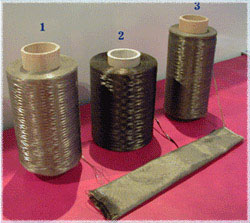ROVING FROM GLASS BASALT COMPLEX STRINGS
Technical Specifications ÒÓ Ó 88.023.020-95 (Without restriction of validity)
 Roving from glass basalt complex strings it is intended for reception of fabrics of various
structure and density, pasting heat-insulated cords, reinforcing of composite materials -basalt
plastics a various structure (further under the text - roving).
Roving from glass basalt complex strings it is intended for reception of fabrics of various
structure and density, pasting heat-insulated cords, reinforcing of composite materials -basalt
plastics a various structure (further under the text - roving).
Roving represents the continuous lock consisting of set number of complex strings,
located in parallel each other. During manufacture on a complex string it is put
lubricant the set structure. Depending on nominal diameter of an elementary fiber
it is made roving following marks: RB-9 and RB-12.
The nominal linear density of complex strings in roving depends on nominal diameter of
elementary fibers and their quantity and makes for mark ÐÁ-9 - (38 ± 6,5) teks, for ÐÁ-12 (55 ± 10).
The nominal linear density roving is defined as product nominal linear density of a complex
string and quantity of complex strings in roving.
On physicomechanical parameters roving should correspond to the requirements resulted in table.
Physicomechanical parameters roving
Table
| The name of a parameter |
Norms for marks |
Maximum deviations |
| RB-9 |
RB-12 |
| Diameter of an elementary fibre, micron | 9,0 | 12,0 | +2/-1 |
| Specific breaking load, not less | 375,0 | 280,0 | |
Mass fraction of a moisture, %, no more, on lubricants:
- "paraffin emulsion"
- ¹ 76 |
1,0
1,5 |
1,0
1,5 | |
| Mass fraction of the substances deleted at burning, %, not less |
1,0 |
1,0 | |
By the order of consumers roving from glass basalt strings can be issued with
diameter of elementary fibers áîëå 14 microns. Limiting diameters of an elementary
fibre lay within the limits of from 8 up to 25 microns.





